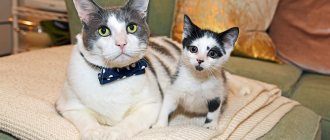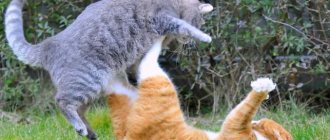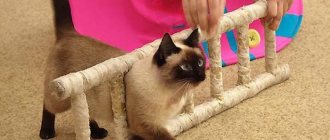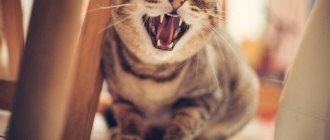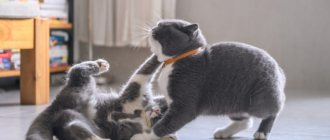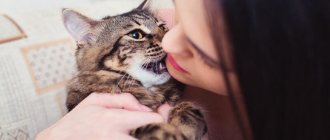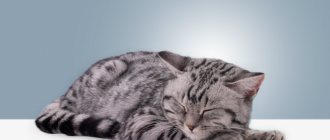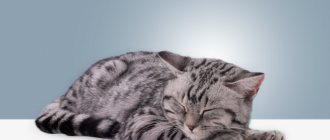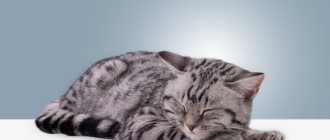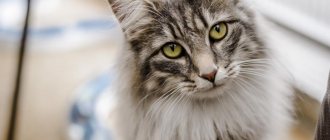A person who has several cats at once will confirm that he has more than once noticed their love for licking each other. Such moments look very cute and make you smile. But have you ever wondered: why do cats lick other cats? Let's figure it out.
It would seem that everything is simple - our human intuition suggests that this is a manifestation of love. But in reality, it turns out, everything is more complicated. Moreover, it is so much more complicated that scientists are carefully studying this phenomenon not only among domestic cats, but also among lions, primates and many other species of mammals.
Ringworm and fungi
Ringworm in animals appears as small patches of baldness. In this case, scabs or erosion may be present on the skin, but this depends on the causative agent of the disease.
Quite often, the reason that an animal licks itself more often than usual is a fungal infection. It is impossible to identify the fungus without special equipment, but dry skin and flaking can help you suspect the disease. It is these symptoms that cause discomfort to the cat, in response to which he constantly licks himself, itches and chews his fur.
Upon careful examination, you will notice the following signs on the skin:
Maternal instinct
The licking of her kittens by a mother cat indicates not only the maintenance of hygiene of the babies, but also other things necessary for the life of the cubs:
- eliminating the characteristic odor that can attract predators;
- stimulating proper breathing;
- facilitating bowel movements and urination in kittens;
- direction of the crumbs to the nipples;
- training in this procedure.
By three weeks, kittens can already lick themselves. Then they begin to lick their brothers and sisters, strengthening family ties. A cat can continue to lick its babies even into adulthood. Scientists have noticed that the children of unscrupulous mothers who poorly cared for their brood grow up to be the same slobs.
Expressing affection and care
Usually, the first thing a kitten feels is the touch of its mother's tongue. In the future, cats lick each other to show love. These animals are very clean, so mutual washing is a whole cat ritual. Consequently, by licking a person’s hands and face, a cat recognizes him as a relative.
Despite the fact that affection is not the most common reason for licking the owner, such behavior is a variant of the norm. If dogs lick their owner for a long time, then cats are less emotional and more often limit themselves to a single touch of the tongue. Experts note that this behavior especially often manifests itself after sterilization, when the animal’s level of aggressiveness drops. The early separation of a kitten from its mother, when a person is involved in feeding it, has a similar effect. Some experts believe that this serves to form the habit of licking and even sucking the owner’s hands already in adulthood.
If the cat stops licking itself
In this case, very quickly her appearance becomes unkempt and unkempt. Giving up a natural habit always indicates serious problems and should cause concern to the owner.
Oral diseases
Often the reason for refusing to wash your face is diseases of the gums and oral cavity. For example, gingitis, the initial stage of periodontal disease.
An inflamed, red area appears around one or more teeth, and over time it becomes covered with ulcers and sores. Any movement of the tongue causes severe pain to the animal and, along with other signs such as putrid odor from the mouth, refusal to wash also indicates this unpleasant disease.
Arthritis of the joints
If a cat develops arthritis of the joints, any movement causes him pain. He washes himself less often and less effectively. If the front paw is affected, it is difficult for the pet to wash its face. But if the back hurts, then usually nothing prevents you from reaching the sore spot, and the animal will lick it especially long and carefully, trying to reduce the discomfort.
Excess weight
Obesity is another problem in modern pets, especially after spaying and neutering. If pets are not switched to proper nutrition after surgery, excess weight will inevitably appear in a few months.
In addition to changes in appearance and gait, insufficient washing is another symptom of this pathology. It is caused by difficulty in mobility and the clumsiness of overweight animals.
Stressful conditions
Sometimes a cat stops licking itself due to severe stress. This is, for example, how a young animal behaves when it changes its owner and place of residence. It has been noticed that a pet sometimes does not drink, eat, go to the toilet or wash itself for several days.
Usually, the patience and affection of a person helps the kitten cope with its depressed state and return to normal life.
Sometimes, out of fear and stress, a cat, on the contrary, begins to wash itself incessantly. This is also a reason to seek veterinary help. Your pet will most likely be prescribed sedatives.
Systemic and infectious diseases
If the cat has stopped licking itself, its fur looks greasy, dirty, this is accompanied by apathy and lethargy, loss of interest in food and games, you should immediately consult a veterinarian.
All severe infectious diseases and chronic pathologies fit this set of primary symptoms, and it is important to quickly establish a diagnosis and begin treatment.
Veterinarians note that in the presence of fleas, other external parasites, helminths, and allergic reactions, the pet, on the contrary, becomes overly active, even more irritable and constantly licks itself.
Licking is associated with higher rank
Another, earlier study found that in most cases, higher-ranking cats groom lower-ranking ones. In this case, most often those animals that are licked sit or lie, while those caring for them take higher positions - standing or sitting upright. A cat, without resorting to fights and other aggressive actions, can show its dominance by licking another.
Maintaining high status
Another finding is that cats of higher status in the pack are more likely to lick less respected cats, and not vice versa. The hypothesis is that perhaps dominant individuals secure their position in this way, which is a safer way compared to fighting.
photo: catster.com
Why do cats lick other animals?
Cats, especially those that live in the same territory, can also lick each other - and there are several reasons that explain this behavior. Firstly, licking other animals is aimed at establishing social bonds with them - and it can really indicate the sympathy of one pet for another. Or maybe not talk. Sometimes in a cat pack, the dominant animals lick the outsiders, thus asserting their status among other animals in the pride.
Secondly, cats often help each other with hygiene. One cat may even ask the other to help with grooming. You may notice that cats most often lick each other's necks or heads—precisely those places that are impossible or difficult to wash on their own.
Thirdly, licking other pets is directly related to the maternal instinct of cats. All cats lick their newborn kittens. This, first of all, helps them stay clean, because kittens obviously cannot take care of themselves in the first weeks of life. In addition, by licking, the cat seems to hide the smell of a newborn kitten, which can attract predators. Licking is also an element of training - already from the fourth week of life, kittens begin to wash themselves.
Social connections
In 2021, for example, the scientific community officially announced that licking each other is one of the three main ways that cats in packs show cohesion.
So, when a cat licks another cat, it means that a social bond has formed between them. Residents of another flock unfamiliar to them, for example, are unlikely to receive such tenderness. And this is quite logical.
photo: catster.com
The more familiar the cats are and the closer they are, the more likely they are to lick each other. A mother cat will happily continue to wash her adult kittens, as they have a special bond.
Reasons for washing cats
All animals lick themselves differently: some begin the procedure from the hind legs, others from the muzzle or shoulders. The tiny tongue does not reach the entire body, then periodically licking wet paws comes to the rescue. Hygiene sessions bring undoubted benefits to the animal, namely:
- Activate the glands that secrete the oily substance sebum. It protects the fur from getting wet and is spread throughout the entire coat by the tongue.
- The secretion contains cholesterol, which is converted into vitamin D under the influence of ultraviolet radiation.
- During cosmetic manipulations with fur, dirt, dead hairs, and parasites are removed. Fleas and ticks do not stay long on a clean and well-groomed body.
- Regulate the temperature by laying the fibers in different directions. The presence of an air layer between the fur and skin allows the body not to overheat in the heat and not freeze in the cold, so keeping the fur clean is the key to the health of the predator.
- Vigorous washing may indicate an animal's confusion or a stressful situation, such as a fight with a neighbor's cat. Washing makes it possible to calm the nervous system, think and retreat to occupied positions. There is an opinion that during a conflict, a cat’s body temperature rises and licking allows the body to quickly return to normal.
If cleanliness is one of the virtues, then cats should live in heaven, in a place specially designated for them. Felines' dedication to neatness gives them a reputation as clean, refined animals. In fact, an adult cat spends 30 to 50 percent of her waking hours demonstrating some type of washing behavior. From the moment of birth, a cat learns self-care techniques. By licking the cubs, the mother cat stimulates the kittens' breathing and their sucking instincts. Licking helps guide blind babies directly to the nipples.
When a mother cares for her kittens, she not only washes them, but also establishes a bond with them. Licking also helps kittens' digestive and excretory systems; The little animals can defecate only when their mother's rough tongue stimulates their tummies.
Two-week-old kittens begin to lick themselves, hygiene and “social” instincts oblige them to do this. Most kittens know how to wash themselves before they leave their mother. But those who were poorly cared for as children become unkempt adults.
Cats clean most of their bodies using their tongue and teeth. The central part of the murka's tongue contains many tiny, backward-facing tubercles. These rough spots make the cat's tongue a perfect cleanser.
After eating, your pet may spend a lot of time licking her mouth, mustache, and chin clean; however, washing is not only about a clean face. During the "sanitary hour" the cat licks and cleans the shoulders, front paws, then the sides, genital area, hind legs and tail from base to tip. Each pussy has its own washing ritual: your own may start its toilet from the shoulders, while another will lick the tail first.
If a cat finds a piece of dirt or something foreign on itself while licking, it gets rid of it with the help of its teeth. She uses her teeth to bite the dirt between her toes and clean it off her paw pads.
But licking and biting alone cannot reach all parts of the body, so for personal hygiene the cat uses either wet front or hind paws. She prefers to “handle” herself with her front paws until they remain slightly wet; First, she passes this “washcloth” over the face and head, from the ears and eyes to the cheeks and chin. After several rubbings, she licks her paws again; Having finished with the head and neck, he proceeds to more distant parts of the body. Having cleaned one half, he changes his paw and repeats the same procedure on the other side of the head.
The same places that cannot be washed with the tongue or front paws are scraped by the cat with the hind paws.
Why do cats wash themselves? You may have noticed that your cat washes itself constantly, while your neighbor's pet only starts washing itself once it gets dirty enough. Or maybe it caught your eye that your pet begins to wash itself after being frightened by a loud noise or having received a scolding for some offense? Humans and cats wash themselves for different reasons; Regular cleaning routines are important for all cats.
1. By pinching its fur, the cat stimulates the glands located on the skin at the base of each hair. These glands produce sebum, a kind of oily secretion that lubricates and protects the fur from moisture. After stimulating these glands during the washing process, the cat spreads sebum throughout the fur with its tongue.
Another significance of this secretion is that it contains cholesterol, which in the sun turns into vitamin D, which helps strengthen bones and teeth, and also helps the cat’s body accumulate calcium and phosphorus. Thus, by washing, Murka provides the necessary elements for the formation of such an important vitamin.
2. Washing the cat in itself is of great importance. During this procedure, the cat removes fallen, dead hair from its fur. Most pussies lose a lot of hair in the spring or during illness; In addition, dry, warm indoor air leads to hair loss in pets all year round. To prevent matting of cats' fur, dead hair must be removed.
But, in addition to inconvenience, often painful, matted fur can become a favorable environment for the development of parasites. Regular washing fluffs up the coat and thus reduces the risk of parasites - ticks, fleas and other insects.
3. Washing helps your cat control its body temperature. Wool plays the role of a protective layer between the body and the environment, and therefore clean and healthy fur better maintains normal temperature.
When a cat washes itself, it places tufts of hair in different directions. And depending on how the hair is styled, she can regulate her own temperature. A cat that washes itself thoroughly usually has smooth, fluffy fur, and it lies in separate layers. When cold weather sets in, the cat uses saliva to smooth out the fur, making it a more effective insulator and helping the body retain heat.
But your pet also washes itself to cool down. Most mammals begin to sweat when they overheat to lower their body temperature. Cats also have sweat glands, but because their body is covered with hair, sweat is only produced on the pads of their paws, which brings relief to the body. This is not enough to completely get rid of excess heat.
The cat smoothes its fur so that the fur allows air to penetrate between the hairs, which cools the skin. Animals may breathe rapidly to keep their bodies cool, but a third of the heat is lost through their skin and fur.
But washing also has social and emotional functions. If washing itself has great health benefits, then the cat's behavior in this case can be regarded as a form of “social interaction”. Kittens begin to lick and wash each other and their mother from the age of three weeks. Mutual washes typically peak between five weeks and four months. Then, as experts testify, this habit fades away.
As they grow older, mutual washing most often occurs between relatives from the same family. However, when several unrelated cats gather and mutual consent is established between them, they can also lick, wash each other and play with each other. An example of this would be a gathering that researchers call a nightclub. This term refers to animal games on neutral, and not on the personal territory of a cat. It is not the warmth of the females that attracts them here; they do not fight among themselves. The animals simply lick each other and greet each other with purrs, and then return to their homes.
During the mutual washing procedure, cats usually lick each other's most inaccessible places - the head and neck. This activity is fun and provides an opportunity to interact with other animals. One could even say that mutual washing is a unique form of communication, an expression of love and friendship. By licking you and accepting your caresses, the pussy tries to involve you in this process, which satisfies not only physical and “social” needs, but also enriches it with positive emotions. The cat loves to be stroked, and by licking itself, it thereby gives a massage.
When you stroke or caress a cat, its nervous system also reacts to this. The heartbeat slows down, and as the body relaxes, muscle tension subsides. At the same time, more gastric juice and saliva are produced, and digestion improves. When a cat is scared or no one pets it, there is a deterioration in the functioning of the digestive organs.
Very often, a cat washes itself when it is confused or frightened by something. Some animal behaviorists believe that washing a cat helps itself overcome conflicts, and massage calms it down. You've probably noticed how a cat, faced with stress, initially reacts violently to it, and then suddenly calms down and begins to wash itself.
Have you ever seen your pet in a difficult situation? For example, how does she roll off the couch and fall on the floor? What does she do immediately after this? Most likely, after looking around the room and seeing no one to watch her, your cat will begin to lick herself. Some cat experts claim that fear or confusion causes an increase in body temperature in these animals and, by washing themselves, they thereby get rid of excess heat.
H. Nepomnyashchiy “Keeping a Cat”
Reasons for the unusual cat habit
Any animal is attached to its owner. It is generally accepted that cats are loners by nature, loving to “stand their ground.” But not everyone should be considered that way. Cats, like people, have different personalities. Some animals absolutely cannot do without their owner and start licking him for an hour.
The main reasons why a cat licks a person are:
- thermoregulation;
- reaction to odors;
- expression of love;
- maternal instincts;
- dominant or passive behavior;
- lack of attention;
- diseases.
Everyone knows that a cat’s body temperature is much higher than a human’s. It is almost 39 degrees. Due to this, cats are extremely thermophilic and require large amounts of heat to warm their bodies. The human body emits a huge amount of heat, which is very attractive to your pet.
Many owners notice that cats prefer to lie down and start licking exactly the place where pain occurs in humans. This is explained by the fact that the diseased organ produces increased heat, which in turn is greatly preferred by representatives of the cat family.
Cats have always been attracted to different smells. For example, they love the smell coming from human hair. Especially after washing your hair. The cat perceives hair as “fur” on humans, so it licks it.
To avoid additional “washing” of your hair, it is recommended to use citrus-scented shampoos. You can also distract your pet from licking with food or toys.
The reason why a cat licks its owner can also be explained as follows. While being in close proximity to a person, the pet experiences such a pleasant feeling of comfort and calm.
If a pet shows an active interest in the child in the house, then it is likely that she perceives the human child as her own. The mother cat is always nearby and constantly licks her babies. For this reason, a “dose” of washing and sleeping in an embrace with a “furry mommy” in such a situation are provided to the child without fail.
In order to avoid some discomfort during sleep, the cat owner is not recommended to accustom her pet to sleep with people. It is important to note that if the animal has not undergone the procedure of castration or sterilization, but has not produced offspring, cats exhibit false maternal instincts. Cats may experience hormonal imbalances. Therefore, it is important for owners who do not plan to breed offspring to resolve this issue in a timely manner.
Persistent licking of the owner's hands or face can be a kind of signal for help for various diseases in the animal. For example, it may be bothered by parasites in its fur, so it becomes restless and licks not only itself, but also people. If you suspect any disease, it is better not to start self-medication, but to consult a specialist.
Why do animals lick each other?
Mutual licking of tailed pets is a unique type of communication. A pattern of cats rubbing their heads is often observed, especially after a long separation. Licking serves as an indicator of trust, care and friendship. If attention extends to family members, then this sign should be considered as a manifestation of love.
Often cats get together on neutral territory in “nightclubs”. Most often, meetings take place on the roof, where all members of the meeting sit in a circle. Having purred to their heart's content and crawled out of each other's fur coats, the cats went home only in the morning. A pleasant massage of the head, neck and back brings pleasure to both the massage therapist and the client. Cats mistake their owners, me in particular, for a strong and big brother. And if suddenly the pet begins to lick his hands or face, it means that this person has managed to earn his respect. In addition to this, the predator has other reasons, including:
- Licking salty areas on human skin helps replenish certain nutritional deficiencies.
- The pungent odor is eliminated as if it were your own.
- The cat strives to ensure that all family members have the same smell.
Help with grooming
Moreover, cats often “ask” their neighbors to help them with grooming. Usually these are parts of the body that are difficult for them to reach.
Have you noticed that people mostly pet and scratch cats on the head or neck area? These are the places that cats most often help each other lick. That is why, if a person begins to stroke other parts of his pet’s body, this often causes discontent and aggression. Scientists working on this issue also came to this conclusion.
We recommend viewing
Why do cats change their sleeping places? Why do cats get in your face while you sleep? Why do cats act strange when you scratch the base of their tail?
Purrs, head tilts, and sleepy eyes are usually positive indicators that both kittens are enjoying themselves and the bond they share.
Take on the role of mother
Although we compare maternal instincts to adulthood, cats mature much faster than we think. In an unspayed female, the first heat cycle may begin soon after gaining independence from her mother - as early as 4-6 months!
Queens subject their kittens to allogrooming within minutes of giving birth:
- clear the birth canal of fluid, feces and urine
- hide the distinct smell of the placenta, which attracts predators.
- eliminate the birth membrane, which “holds” the kitten in a bubble-like structure.
- pass on your unique scent to your fellow humans.
- Stimulate the bowels and bladder to empty their contents (which happens regularly during the first few weeks).
During the first four weeks of a mother cat's life, she regularly cleans up her kittens' litter as the kittens become more independent. The loving touch of mother's tongue never fades from a cat's memory, and many kittens themselves become attached to these maternal instincts as they grow older.
Adult cats may groom each other, sending signals of protection and affection, just as their mothers did in those critical first few weeks.
Assertion of dominance (and submission)
Bringing a cat into your home can be stressful and anxiety-inducing for everyone. Once you adopt a new kitten, you will know that your pet is territorial, vicious, or, by his own admission, a loner. The first allogrooming session you accidentally interrupt will make your heart swoon and your eyes light up: “I’m so glad they learned to love each other!”
Although many cats prefer aloofness rather than a pack mentality, in every multi-cat household there is an unspoken order (dominance ranking). Dominant cats will assert their role as "alpha" through subtle - or not-so-subtle - intimidation tactics such as:
- grabbing a bowl of food or water
- Mark (or spray) valuables to say, “It’s mine now!”
- Chasing, attacking, following, or cuddling another cat.
- Blocking another cat's path or cornering it
- look at each other aggressively
- Woo someone else
Grooming may not quite fit into the above list, but it is definitely a dominant cat behavior that many cat owners shamefully overlook. These cute cat baths are a secret way for alpha cats to spread their unique scent onto your submissive kitty's fur.
Even if the intentions are not as noble as they seem, a stable home hierarchy will maintain peace and provide you with peace of mind. Dominant cats calm their latent aggression with impromptu cleaning. Submissive cats appreciate the relaxation of a seemingly polite allogrooming session.
Regular cat grooming can be an intrusive and inevitable trigger for misophonia. The 21-minute video below shows that allogrooming between feline siblings is an exception:
